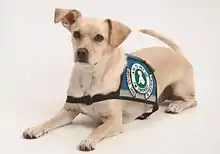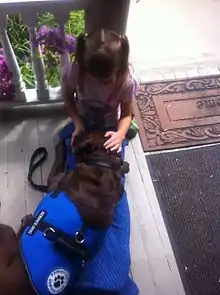Psychiatric service dog
A psychiatric service dog is a recognized sub-category of service dog trained to assist their handler with a psychiatric disability or a mental disability, such as obsessive-compulsive disorder, post-traumatic stress disorder, schizophrenia, depression, anxiety, and bipolar disorder.[1][2]
A psychiatric service dog can assist their handler by providing a safe presence that grounds them; the dog may perhaps lean on the person to provide a calming pressure. [3]
Training


Like all assistance dogs, a psychiatric service dog is individually trained to do work or perform tasks that mitigate their handler's disability.[4] Training to mitigate a psychiatric disability may include providing environmental assessment (in such cases as paranoia or hallucinations), signaling behaviors (such as interrupting repetitive or injurious behaviors), reminding the handler to take medication, retrieving objects, guiding the handler from stressful situations, or acting as a brace if the handler becomes dizzy. Moreover, the dog can be an extremely useful companion in any controlled training concerning cognitive functions, such as walking the dog.[5][4]
Psychiatric service dogs may be of any breed or size suitable for public work. The ADA regulations specify that only dogs, or in specific cases, miniature horses, may work as service animals.[6] Many psychiatric service dogs are trained by the person who will become the handler—usually with the help of a professional trainer. Others are trained by assistance or service dog programs. Assistance dog organizations are increasingly recognizing the need for dogs to help individuals with psychiatric disabilities, and there are even organizations dedicated specifically to supporting psychiatric service dog handlers.
Accessibility
In the United States, the Americans with Disabilities Act defines a disability as "a physical or mental impairment that substantially limits one or more of the major life activities of such individual,"[7] and therefore allows handlers of psychiatric service dogs the same rights and protections afforded to those with other types of service animals.[2] Service dogs, including psychiatric service dogs, are allowed to accompany their handler in any location that is normally accessible to the public regardless of whether health codes or business policies normally would allow a dog to enter, provided the dog behaves properly and does not interfere with normal operations (e.g. barking, biting, defecating, or obstructing other people) or pose a direct threat to the safety of others.
The Fair Housing Act also allows tenants who have service animals or emotional support animals to stay in housing that does not allow pets.[8] Some individual state laws may provide additional guidelines or protection.
The Air Carrier Access Act has permitted psychiatric service dogs animals to travel in the cabin with their handler. Due to negative incidents with services dogs and emotional support animals, from 2018 through 2020 there has been a push to limit or restrict dogs on flights on US flights.[9][10]
Social issues with accessibility
People with psychiatric service dogs often face several problems that other service dog handlers typically do not experience. While guide dogs for the blind, hearing-impaired guide dogs, and dogs that assist those who use wheelchairs are well known to the public, however, dogs for psychiatric conditions are not. This hinders the public's understanding of the role played by each of these types of animals, as well as their perceptions regarding the legitimacy of their integration.[11] Further adding to this issue is that many people with psychiatric conditions do not appear to have anything externally wrong with them, and because of the heavy social stigma of mental illness, the handler may be reluctant to explain their condition or the dog's trained tasks even in the vaguest of terms. In addition, the dogs can be any size (even toy breeds) depending on their trained task, yet there is a common public misconception that all service dogs are medium or large breeds. Any of these issues can lead to other people inappropriately impugning the dog's status or pressing the handler to divulge medical information about themselves.
See also
References
- Esnayra J (July 2007). "Help from man's best friend. Psychiatric service dogs are helping consumers deal with the symptoms of mental illness". Behav Healthc. 27 (7): 30–2. PMID 18027616.
- Service Dog Central - Psychiatric Service Dogs Retrieved on August 17, 2007.
- Esnayra, Joan (July 2007). "Help from man's best friend: psychiatric service dogs are helping consumers deal with the symptoms of mental illness". Behavioral Healthcare – via Northeast State Database.
- Service Dog Central - Psychiatric Service Dog Tasks
- International Association of Assistance Dog Partners - Service Dog Tasks for Psychiatric Disabilities Retrieved on January 31, 2007.
- "ADA 2010 Revised Requirements: Service Animals". www.ada.gov. Retrieved 2019-04-23.
- "Americans with Disabilities Act of 1990,AS AMENDED with ADA Amendments Act of 2008". www.ada.gov.
- Questions and Answers about Fair Housing
- "US will redefine 'service animals' flying with their owners on flights". CNBC. January 22, 2020.
- "Service Animals (Including Emotional Support Animals) | US Department of Transportation". www.transportation.gov.
- Schoenfeld-Tacher, Regina; Hellyer, Peter; Cheung, Louana; Kogan, Lori (2017-06-15). "Public Perceptions of Service Dogs, Emotional Support Dogs, and Therapy Dogs". International Journal of Environmental Research and Public Health. 14 (6): 642. doi:10.3390/ijerph14060642. ISSN 1660-4601. PMC 5486328. PMID 28617350.